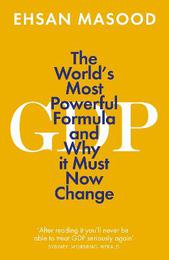
|
GDP: The World's Most Powerful Formula and Why it Must Now Change
Paperback / softback
Main Details
| Title |
GDP: The World's Most Powerful Formula and Why it Must Now Change
|
| Authors and Contributors |
By (author) Ehsan Masood
|
| Physical Properties |
| Format:Paperback / softback | | Pages:304 | | Dimensions(mm): Height 198,Width 129 |
|
| Category/Genre | Economic theory and philosophy |
|---|
| ISBN/Barcode |
9781785787119
|
| Classifications | Dewey:339.31 |
|---|
| Audience | | Tertiary Education (US: College) | | Professional & Vocational | |
|---|
|
Publishing Details |
| Publisher |
Icon Books
|
| Imprint |
Icon Books
|
| Publication Date |
4 March 2021 |
| Publication Country |
United Kingdom
|
Description
Gross Domestic Product (GDP) is the world's economic health-check, an influential ranking of global prosperity. A rising number is manna for markets and keeps business buzzing; a falling one is a portent of doom for everyone. But, as science writer Ehsan Masood deftly shows, GDP can be unforgiving for those countries that cannot be - or choose not to be - measured by its rules. And it fails to measure much of what is really important to our lives. GDP was created to help Western economies rebuild after the horrors of the Great Depression and to rise again from the fires of the Second World War. But it simultaneously rewarded decades of environmental destruction, and now, amid an unprecedented economic crisis, it faces a fight for its survival. What began as a useful formula to assess a country's path to prosperity, has trapped societies and leaders into a system of measurement from which the world has to break free. We must, and this book shows how we can.
Author Biography
Ehsan Masood is a senior editor at the science journal Nature. He is a former Knight Science Journalism Fellow at MIT and has written and presented documentary programmes for BBC Radio 4. His previous books include Science and Islam: A History (Icon, 2017).
Reviews'Masood contends that GDP is a bill of goods the developed world foisted on emerging nations. It is flawed, he argues, because the monetary value of all goods and services produced in a country makes no reference to social well-being or inequality. Masood is also troubled by GDP's failure to consider the environmental damage that is, at times, a byproduct of growth. Many of Masood's criticisms have merit. He presents some interesting alternatives. He favors revolutionary change.' -- Roger Lowenstein, Wall Street Journal, USA If you ever thought that economic policy could never make for gripping drama, try reading this book. -- Khurram Husain, Dawn Ehsan Masood unveils the genesis of GDP and how it shaped the modern economic paradigm. It comes at a time when a growing number of people are questioning this flawed metric. -- Down to Earth Fascinating. Whether happiness should be embedded into decisions on the economy is an important one, and whether GDP should be abandoned in favor of something better is too. Masood's book helps raise those questions and others in a thought provoking manner. That's much needed in every endeavor these days, and needed in few places more than in the economics profession. -- Simon Constable, Forbes, USA An interesting book. Masood doesn't merely criticize the overreliance on GDP: he also explores ongoing efforts to develop a satisfactory substitute or supplement that would yield a more accurate picture of economic activity and its effects. -- Foreign Affairs, USA In lively prose, Masood argues that GDP is flawed because it ignores volunteering, housework, environmental degradation, job satisfaction, and income inequality. -- Kirkus Reviews Masood covers decades of challenges to GDP conventions that make for a fascinating institutional and human story. -- Diane Coyle, Nature Masood's highly readable book is a useful reminder of what GDP is and what it isn't. -- N. Gregory Mankiw, Science After reading it you'll never be able to treat GDP seriously again. -- Nicholas Stuart, Sydney Morning Herald, Australia The writing is effortless and intriguing. Like a novel, it weaves personal stories and the significance of individuals into a narrative about tectonic shifts in world politics. * Maria Ivanova, Associate Professor of Global Governance at the University of Massachusetts Boston, and author of The Untold Story of the World's Leading Environmental Institution: UNEP at Fifty * [A] tale of cloak and dagger intrigue, intense rivalries and political machinations you'd expect in a spy thriller.' -- Engineering & Technology [A] persuasive witness for the prosecution in the case against GDP mania. * Business Standard, India *
|